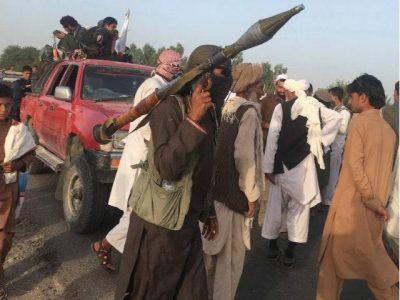
Islamic State terrorist group taking advantage of deteriorating conditions and recruiting disaffected young people
Most of the foreign takfiri fighters held in Syria’s containment camps and living in the country’s north-western Idlib province are spurned by their home countries and their wives and hapless children are rejected for repatriation. Consequently, these people have nowhere to go.
Hundreds of takfiri fighters are imprisoned by the US-backed Syrian-Kurdish-dominated Democratic Forces regime in the northeast while as many as 30,000 are stuck in Idlib.
The 70 per cent of Syria under government control does not want them. Iraq and the 50 countries from which they come reject them. This is true also for Hay’at Tahrir Al Sham, which rules Idlib with an iron hand and the Kurds who hold 25 per cent of Syria’s territory. They are compelled to guard and provide for the takfiris. They are forever prisoners of an unfinished, decade-long war.
Al Hol camp in north-eastern Syria near the Iraq border houses 43,000 mainly women and children of fighters as well as low level fighters: half are Iraqis, a quarter Syrians, and the rest non-Arab foreigners. The UN children’s fund, UNICEF, estimates that 22,000 are children. Since there is no schooling or sports programmes for them, they are growing up without something to do, without a homeland, without a future.
Conditions are crowded and harsh. Residents are constantly confronted by Daesh loyalists seeking to intimidate, impose control and conservative restrictions on them, and secure fresh recruits for their cause. Children as young as four or five are indoctrinated by Daesh and often verbally abuse or throw stones at camp guards and visitors. Al Hol is a hell hole.
The situation is better in the much smaller al-Roj camp in the same area. It houses 1,400 persons, the majority Iraqis but also some Europeans. Daesh does not have a firm grip on Al Roj residents. Iraqis remain in the camp because they have nowhere to go as their villages and homes have been destroyed or former neighbours who were persecuted by Daesh do not want them to return.
Early last month, the Dutch government repatriated a woman, who faced no criminal charges, and three children who had been living in al-Roj camp. This was, however, only the second time Dutch citizens were allowed to go home from northern Syria. Two orphans were repatriated in June 2019. A British woman Shamima Begum, 21, who travelled from London to join Daesh as a teenager, was moved for her own safety from Al Hol to Al Roj. She has lost her British nationality and has been refused permission to return home. Britain is among the countries which do not repatriate their nationals.
US envoy to the anti-Daesh coalition, John Godfrey warned that those held in Syria’s camps “constitute a potential threat to security in the region and beyond”. The US has repatriated 28 of its citizens, of whom 12 are adults and 10 have been prosecuted or are under prosecution.
US Secretary of State Antony Blinken called on US allies to repatriate their nationals and
escribed the imprisonment of 10,000 suspected Daesh fighters, some 2,000 of whom are foreigners, as “untenable”.
COVID has slowed the repatriation of children. Only about 1,000 have been sent home since
the fall of Daesh in Iraq in 2017.
Ironically, the US expresses concern about the residents of internment camps in north-east Syria while Washington and its allies tolerate the rule of Al Qaeda offshoot Hay’at Tahrir Al Sham (HTS) in the north-western province of Idlib. HTS — which operates under Turkish protection — has consolidated its grip on Idlib over the past year by forcing smaller factions to merge or dissolve and send fighters home. According to Al Monitor, HTS has now tackled Jund Al Sham, a small, mainly Chechen group, headed by Muslim Al Shishani who rejected this demand and asked HTS to allow the faction to remain independent and focus only on the battle with the Syrian army while staying out of provincial social and political affairs.
However, HTS is intent on asserting control over Idlib and eliminating other factions with the aim of establishing a one party administration and a separate, fundamentalist entity in Idlib. This would divide Syria, pose a threat to this region comparable to the false “caliphate” created by Daesh and amount to a takfiri base on the eastern shore of the Mediterranean. While HTS may claim it does not intend to export its ideology or fighters, the very existence of such an entity wouldamount to a fundamentalist challenge to regional and European governments.
Meanwhile, Daesh elements are taking advantage of deteriorating conditions in Iraq and Syria to regroup and recruit disaffected young people. While post-war Syrian reconstruction and economic revival have been prevented by US sanctions, in both countries drought, poor harvests, corruption, rising unemployment and increasing poverty are creating an economic crisis. Daesh is making a come back in mountainous northern Iraq and rural western Iraq as well as desert areas of eastern Syria.
Having replaced secular Baathists in Iraq with sectarian Shiites and waged war against the Baath in Syria, weakening the anti-takfiri government, the Western powers incompetently led by the US, cannot deal with the chaos they have created. The hurried US and NATO withdrawal from Afghanistan after 20 years of failing to eliminate the Taliban can only encourage and empower takfiris.
Source: Jordan Times





